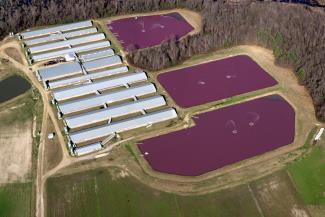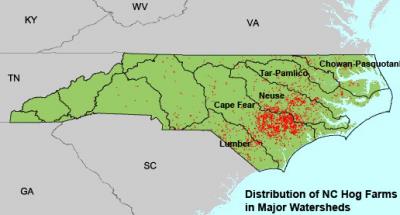Smithfield Foods Settles with Plaintiffs over North Carolina Hog Nuisance Cases
|
11/23/2020 |
|
In 2014, five hundred residents of homes in close proximity to farms either owned by or contracted to Smithfield Foods filed nuisance lawsuits. Five cases went to trial resulting in jury verdicts in favor of plaintiffs who were awarded substantial direct and punitive damages. In accordance with a hastily enacted state law, punitive damage awards were reduced to approximately $100 million. Smithfield Foods appealed to the U.S. Circuit Court of Appeals in Richmond, VA claiming irregularities in the trials heard by the U.S. District Court in Raleigh, NC. Two of the judges on the panel of three denied the appeal for a new trial with one dissenter, Judge G. Steven Agee.
Subsequent to the denial of appeal Smithfield decided to settle with the plaintiffs. Keira Lombardo, Chief Administrative Officer spun the legal outcome stating, “In the midst of a global pandemic, where food shortages are commonplace it is now time to keep our full attention on the important work of producing good food in a responsible and sustainable way rather than returning to the court for what would be an ongoing and distracting litigation.”
|

NC Hog farm with lagoons |
|
 Evidence in the five trials showed that there were alternatives to the traditional system of storing hog waste in lagoons followed by spraying on pasture resulting in odor complaints. Plaintiffs’ attorneys claimed that the company was aware of the problems caused by their contractors’ manure disposal and were cognizant of technical solutions, but “willfully chose not to do anything about it.” According to plaintiffs’ attorneys, Wallace and Graham, the law firm opted to sue Smithfield Foods rather than the contractors based on the depth of the pockets of the integrator Smithfield a subsidiary of the WH Group of China. Evidence in the five trials showed that there were alternatives to the traditional system of storing hog waste in lagoons followed by spraying on pasture resulting in odor complaints. Plaintiffs’ attorneys claimed that the company was aware of the problems caused by their contractors’ manure disposal and were cognizant of technical solutions, but “willfully chose not to do anything about it.” According to plaintiffs’ attorneys, Wallace and Graham, the law firm opted to sue Smithfield Foods rather than the contractors based on the depth of the pockets of the integrator Smithfield a subsidiary of the WH Group of China.
In his opinion, Judge J. Harvie Wilkinson III referred to “outrageous conditions at Kenlaw Farms.” citing neglect of both animal and human welfare. The opinion which has now entered case law supports the contentions of Senator Cory Booker [D-NJ] and Senator Elizabeth Warren [D-MA] who are promoting legislation to ban all CAFOs. Judge Wilkinson referred to the “decades-long transition to concentrated animal feeding operations that lays bare the connection between animal welfare and human welfare and the consequences of its breach.”
In reality the problem is not attributable to either the large numbers of hogs held on a single farm or their stocking density. Generation of odor and contamination of groundwater is due to the primitive waste disposal system inconsistent with the volume of fecal material produced. As with egg-production farms that previously used flush removal of manure with lagoons systems, the the installations on hog-CAFOs in North Carolina provided inadequate storage and relied on frequent spray application on limited areas of pasture for disposal. If Smithfield Foods and other hog producers wish to remain in North Carolina and possibly other states, given the precedent created by these five cases, alternate technology including anaerobic digestors will be required at considerable capital costs.
Given the prospect of more stringent environmental regulations to be imposed by the incoming Administration and the reaities of tort law, all operators of CAFOs including egg-production complexes should consider the potential for nuisance and environmental degradation from their operations. Many existing and new complexes have invested in manure drying and composting installations to turn the liability of manure into a positive income stream. Many existing and new complexes have invested in manure drying and composting installations to turn the liability of manure into a positive income stream.
The Smithfield Foods cases will have profound implications for all intensive livestock production. The technology to be a good neighbor and steward of the environment is available and the clock is ticking.
|

|
|
|